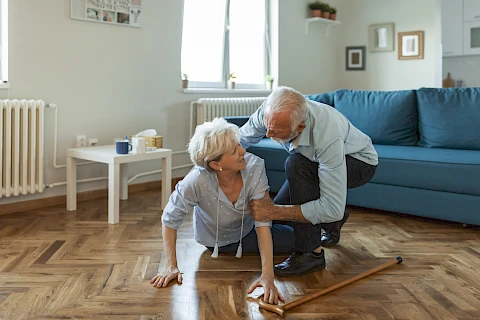
Falls are one of the leading causes of injury among seniors. Many falls can result in serious injuries, such as fractures or head injuries. Unfortunately, these accidents often lead to a loss of independence and a decline in quality of life. One crucial factor in fall prevention often goes unnoticed: eye health. Good vision helps you safely navigate your surroundings and avoid falls and related injuries.
The Link Between Poor Vision and Falls
Visual impairment significantly increases the risk of falls among seniors. When vision is poor, it becomes challenging to perceive hazards and navigate uneven surfaces. This is particularly true for seniors who are more susceptible to common vision problems. Conditions like cataracts, glaucoma, and macular degeneration are prevalent in older adults and contribute to poor eyesight. Cataracts cloud the lens of the eye, making vision blurry. Glaucoma can cause tunnel vision, while macular degeneration affects sharp, central vision. These conditions can make it difficult to see obstacles and increase the likelihood of falls.
The Impact of Falls on Seniors
Falls can have severe physical consequences for seniors. Common injuries include fractures—often of the hip, arm, or wrist—and head injuries, which can sometimes be life-threatening. Beyond the physical harm, falls also have emotional and psychological effects. Fear of falling again can lead to reduced activity, which can, in turn, result in physical weakness and even more falls. The financial implications are equally concerning. Medical costs for treating injuries from falls can be substantial.
Maintaining Good Eye Health
Maintaining eye health offers fall prevention. One of the primary steps is regular eye check-ups. Eye exams can detect changes in vision early, allowing for timely treatment. You want to update eyeglasses or contact lens prescriptions regularly. Wearing the correct prescription can make a significant difference in visual clarity and overall safety. Proper lighting helps reduce fall risk. Ensure that your home is well-lit, especially hallways, staircases, and entrance areas. Adding night lights in bedrooms and bathrooms can help you move around safely during the night.
Additional Tips for Fall Prevention
In addition to focusing on eye health, other measures can prevent fall risk. Encouraging physical activity can greatly improve balance and strength. Simple exercises such as walking, yoga, or tai chi can be very beneficial. Some medications have side effects like dizziness or blurred vision, which can increase fall risk. Regularly review medications with your healthcare provider to ensure they're not contributing to vision or balance issues. Nutrition is important in maintaining eye health. Foods rich in vitamins A, C, and E, as well as omega-3 fatty acids, support good vision. Incorporate leafy greens, fish, nuts, and colorful fruits into your diet for optimal eye health.
Take Steps to Safer Living
Eye health is a critical aspect of fall prevention in seniors. Regular eye check-ups, wearing updated eyeglasses, and ensuring proper lighting can significantly reduce the likelihood of falls. Taking proactive steps to maintain eye health and create a safer living environment can help seniors live independently and more confidently.
If you or your loved ones need assistance with fall prevention and maintaining eye health, contact Senior Helpers Harrisburg. We offer professional support in Harrisburg, Camp Hill, Mechanicsburg, Palmyra, and Dauphin County to ensure the safety and well-being of your loved ones.